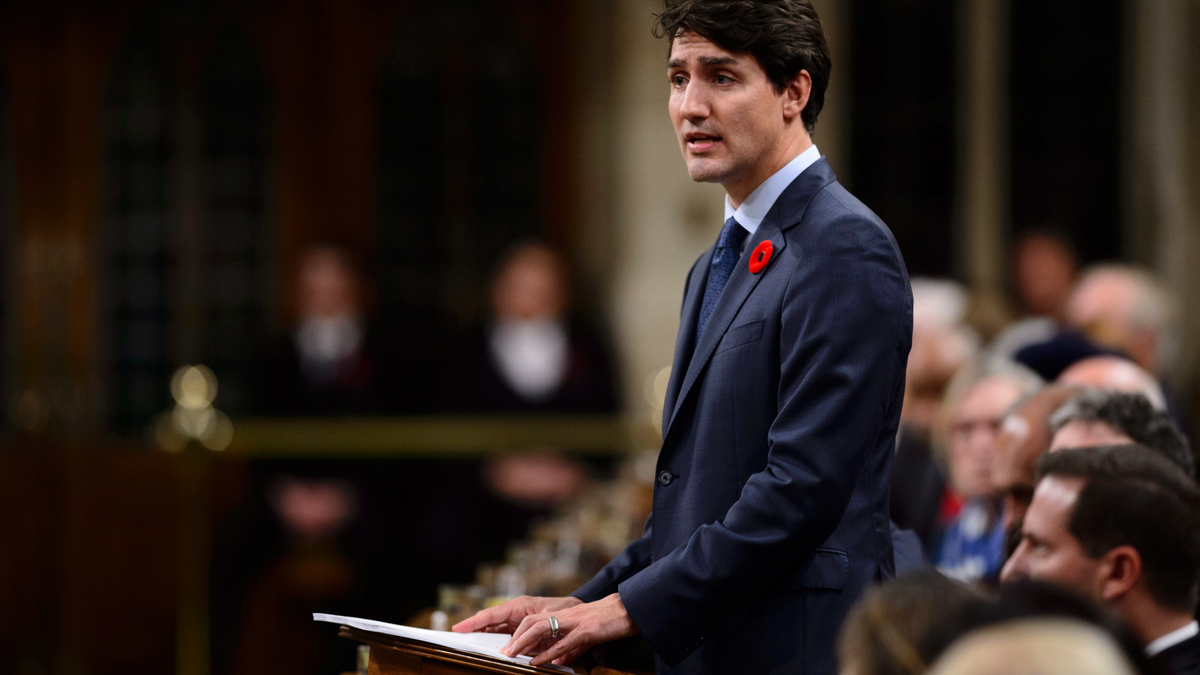
A third Canadian has been detained in China, the Canadian government said Wednesday, but Canadian Prime Minister Justin Trudeau said the latest case doesn't seem to the fit the pattern of the previous two, adding that he favors de-escalating tensions. (Sean Kilpatrick/The Canadian Press via AP)
Canadian Prime Minister Justin Trudeau said Wednesday that although a third Canadian has been detained in China, he doesn’t want to escalate the international situation.
"Escalation or very strong political statements can actually end up being counterproductive to," Trudeau said, noting political posturing or statements are not necessarily going to help those detained. "Escalation and political posturing might be satisfactory in the short term to make yourself seem like you are stomping on the table and doing something significant, but it may not contribute to the outcome we all want."
The latest case doesn't seem to fit the pattern of the previous two, and Trudeau said he favors de-escalating the tensions.
"There are tens of thousands of Canadians that live, travel and work in China," Trudeau said at a year-end news conference. He added that the new case "doesn't seem to fit the pattern of facts on the previous two."
Trudeau said it appears to be a routine case, not involving the sort of national security charges listed against the other two. He brought up the possibility of it being a visa issue.
He said officials are working to get more details.
Global Affairs Canada said it is aware of a third Canadian citizen detained in China, and consular officials are providing assistance to the family.
David Mulroney, a former ambassador to China, said it would be highly unusual if the third arrest is a coincidence. "It's possible but I find it unlikely," he said.
Mulroney said it would be a problem for Canada and China. "One detention is bad enough. Two is terrible. Three underlines how ruthless China can be," he said. "It serves as a reminder for people that China is a detention state."
The first two cases appeared to be in retaliation for the arrest of a top Chinese tech executive in Canada on behalf of the United States.
Meng Wanzhou, the chief financial officer of Chinese telecommunications giant Huawei, was arrested in Canada on Dec. 1 at the request of the United States, which wants her extradited to face charges that she and her company misled banks about the company's business dealings in Iran.
The Chinese then secretly detained two Canadians on Dec. 10 on suspicions of "engaging in activities that endanger the national security" of China. Beijing didn't allow Canadian officials to see Michael Kovrig, a former diplomat in China, for four days, and Canadian entrepreneur Michael Spavor for six days. Meng is out on bail in Canada.
The case has set off a three-way diplomatic spat in which Canada is stuck in the middle. President Trump complicated matters by saying he might intervene in the case if would help clinch a U.S. trade agreement with China — much to the consternation of Canadian officials who said the arrest was not political and they were just following their extradition treaty obligations.
U.S. Secretary of State Mike Pompeo called last Friday for China to release the Canadians, saying their detention was "unlawful" and "unacceptable."
Roland Paris, a former foreign policy adviser to Trudeau, said the Trump administration should recognize the importance of countering Chinese efforts to pressure Canada over the extradition of an individual wanted by the U.S.
"What is the United States doing to help gain the release of two Canadians — and now potentially a third — detained by China in apparent retaliation for Canada's lawful arrest of Ms. Meng? Washington should be using its considerable leverage to support Canada," Paris tweeted.
The Associated Press contributed to this report.





















